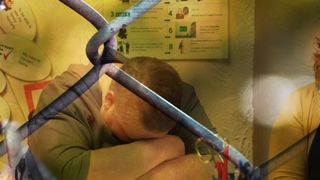
Health secretary Matt Hancock has ordered a review of the long-term treatment of people with learning disabilities or autism.
Mr Hancock has asked hospital inspectorate the Care Quality Commission (CQC) to open an urgent investigation into practices including the use of seclusion and segregation of patients within secure hospitals.
The health secretary’s intervention comes after coverage of the treatment of more than 2,300 people with autism or a learning disability currently detained in secure hospitals, known as Assessment and Treatment Units (ATUs), since 2015.
Earlier this week a Sky News investigation revealed that at least 40 people have died while admitted to an ATU in the last three-and-a-half years.
It also exposed the plight of one man who has spent 18 years detained in an ATU 100 miles from his parents’ home to which he was originally admitted for just nine months.
Mr Hancock is known to have been particularly concerned at the case of a 17 year-old girl kept in seclusion in an ATU, whose father is only able to communicate with her through a hatch when he visits.
He has ordered an urgent NHS England review of her case, and following a meeting with her father, who has detailed her treatment on social media, has ordered the CQC to look at practices in the sector.
In his letter to the chief executive of the CQC Mr Hancock writes: “Since becoming Secretary of State for Health and Social Care I have become increasingly concerned about the use of seclusion settings for those with autism and learning disabilities.
“Under Section 48 of the Health and Social Care Act 2008 we are requesting that you immediately initiate a Care Quality Commission thematic review into the practice of prolonged seclusion and long-term segregation for children and adults with a mental illness, learning disability or autism in secondary care and social care settings.
“In the circumstances I request that this review be expedited and completed as quickly as is feasible. I look forward to seeing the findings of this work to ensure that we can eliminate inappropriate restrictive practices and ensure that vulnerable people supported by health and social care are accorded the best possible care.”
Last week Mr Hancock told Sky News that he was “not happy” with the lack of progress on a government promise to close up to half of the beds in ATUs, and said some of the cases highlighted were unacceptable.
The use of restraint in ATUs, including seclusion, medication and physical restraint, has soared in the last two years, with more than 26,000 incidents of restraint in 2017.
NHS England say the increase may be explained by better reporting by institutions.
Sir Stephen Bubb, who has written two reviews of the government’s progress on ATUs, told Sky News restraint was “barbaric” and should be outlawed.
Government policy is to move people with a learning disability or autism into community care settings, but many are trapped in ATUs or similar institutions.
People are supposed to be admitted to ATUs for nine to 18 months, but the average length of stay is five-and-a-half years.







